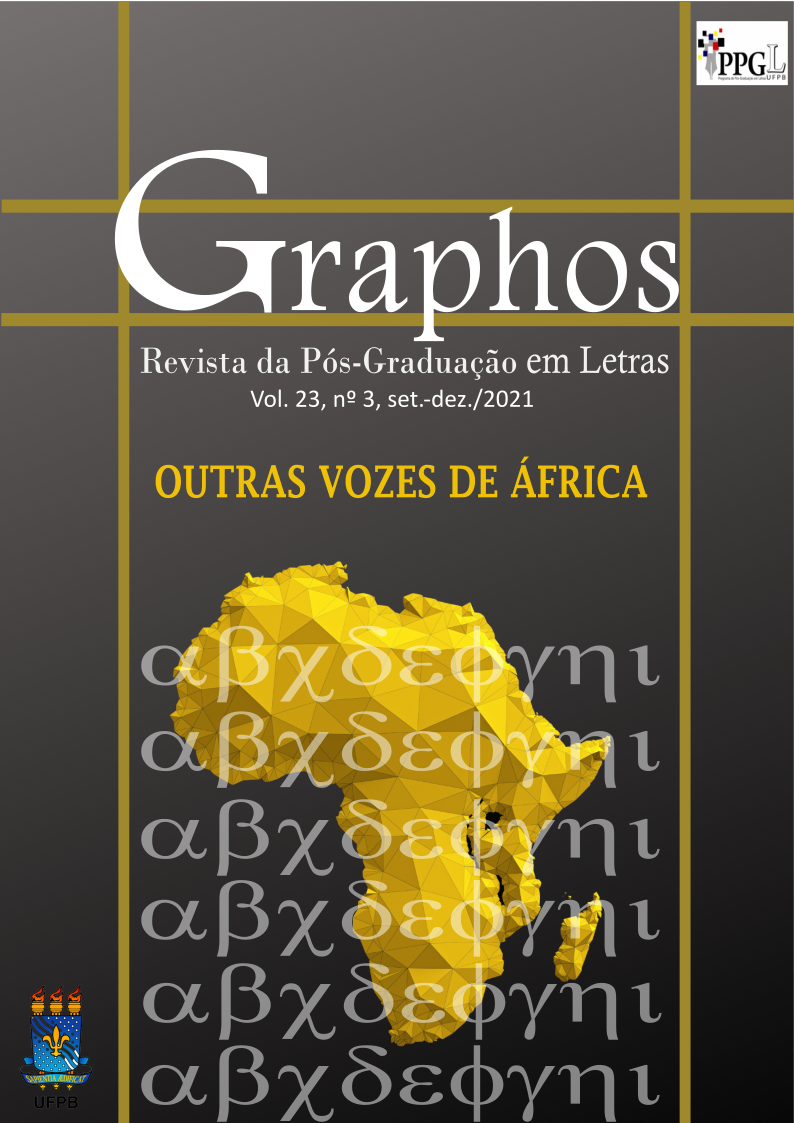African patriarchy in the prose of Ousmane Sembène
DOI:
https://doi.org/10.22478/ufpb.1516-1536.2021v23n3.60400Keywords:
Literature, Ousmane Sembène, Senegal, Patriarchy, PolygamyAbstract
Senegalese Ousmane Sembène (1923-2007) stands out among the first generation of filmmakers from sub-Saharan Africa. His last two films, Faat Kiné (2000) and Moolaadé (2004), offer a critical view of African patriarchy. His cinematographic art has become more internationally known than his literary art although this criticism also appears in his book entitled Voltaïque (1962). Adopting a thematic and transversal analysis of three novellas from that book, this paper aims to unravel Ousmane Sembène’s criticisms of the African patriarchy and polygamous system. It seeks to demonstrate how the novellas “Ses trois jours,” “Souleymane” and “Lettre de France” contain some sociological and historical elements for the analysis of the female condition under patriarchy that later gained prominence in the feminist Marxism of Silvia Federici (2019) and in “Sub-Saharan reflection” by Odome Agone (2021). At the avant-garde of the French-speaking critique of African patriarchy, Sembenian’s prose also anticipated that of his compatriot Mariama Bâ in Senegalese literature. The analysis points that the three novels reveal a literature engaged in the mission of emancipating men and women in a context of political independence of African countries and new projects of post-colonial society.
Downloads
References
ADICHE, Chimamanda Ngozi. Sejamos todos feministas. São Paulo: Companhia das Letras, 2014.
AGONE, Odome. Femmes noires francophones - Une réflexion sur le patriarcat et le racisme aux XXe-XXIe siècles. Paris: Hermann, 2021.
BÂ, Mariama. Une si longue lettre. (1 ed. 1979). Paris: Rocher, 2013.
BOURHANE, Hassane. L’œuvre littéraire et cinématographique de Sembène Ousmane face à ses lecteurs. Thèse (Doctorat en littérature générale et comparée), Université de Cergy- Pontoise, Paris, 2008.
BOVÉ, Bruno. Sembène Ousmane (1923-2007), une biographie. Africultures, n.76, p.26-45, 2009. DOI: https://doi.org/10.3917/afcul.076.0028
CORREA, Sílvio Marcus de Souza. Ousmane Sembène: uma África traduzida em palavras e imagens. In: CARVALHO FILHO, Sílvio de Almeida; NASCIMENTO, Washington Santos (orgs.). Intelectuais das Áfricas. Campinas, SP: Pontes Editores, 2018, p. 169-202.
DIAGNE, Ismaïla. Les sociétés africaines au miroir de Sembène Ousmane. Paris: L’Harmattan, 2004.
DIOP-HASHIM, Aïssatou. “Sanni Kaddu”. À la découverte du discours féministe au Sénégal. Dissertation (Doctorate in Philosophy). Faculty of Graduate School of the University of Maryland, Mayland, 2011.
FEDERICI, Silvia. Le capitalisme patriarcal. Paris: La Fabrique, 2019.
FEDERICI, Silvia. O ponto zero da revolução: trabalho doméstico, reprodução e luta. São Paulo: Elefante, 2019.
FEDERICI, Silvia. Calibã e a bruxa: mulheres, corpo e acumulação primitiva. São Paulo: Elefante, 2017.
GADJIGO, Samba. Ousmane Sembène. Une conscience africaine. Paris: Présence Africaine, 2013.
GADJIGO, Samba. Ousmane Sembène: Les enjeux du cinéma et de la littérature. In: NYANG, Sada. Littérature et cinéma en Afrique francophone: Ousmane Sembène et Assia Djebar. Paris: L’Harmattan, 1996, p. 111-121.
McDONALD, Patrick. The Power of (Third World) Women: Liberation and Limits in “God’s Bits of Wood”. Research in African Literatures, v. 46, n. 3, Indiana University Press, p. 146–64, 2015. DOI: https://doi.org/10.2979/reseafrilite.46.3.146
MARCOUX, Richard; ANTOINE, Philippe. Le mariage en Afrique. Pluralité des formes et des modèles matrimoniaux. Québec: Presses de l’Université du Québec, 2014. DOI: https://doi.org/10.2307/j.ctt1f117sb
MBENGUE, Papa W. Sembène Ousamne: Récit écrit et récit filmique. These (Doctorat de 3e cycle), Université de Paris X – Nanterre, 1982.
MURPHY, David. Imagining Alternatives in Film and Fiction-Sembène. Oxford: Africa World Press Inc., 2001.
RAPFOGEL, Jared; PORTON, Richard. The Power of Female Solidarity (2004). In: BUSCH, Annett; ANNAS, Max (eds.) Ousmane Sembène Interviews. Mississippi: University Press of Mississippi, 2008, p. 197-209.
RUFA’I, Ahmed. L’image de la femme africaine dans l’œuvre d’Ousmane Sembène, (M.A), Université de Sherbrooke, 1983.
SALL, Abdoulaye. La critique religieuse dans l’oeuvre romanesque de Sembène. Thèse (Doctorat 3e cycle), Dakar: UCAD, 2007.
SEMBÈNE, Ousmane. Voltaïque, suivi de La Noire de... (1ed. 1962). Paris: Présence africaine, 2013. DOI: https://doi.org/10.3917/presa.036.0090
SYLLA, Fanta. Le Processus de la prise de conscience des personnages féminins de Bertolt Brecht ( La Mère) et d’Ousmane Sembène (Les Bouts de Bois de Dieu): Une approche genre ? Thèse (Doctorat 3e cycle), Dakar: UCAD, 2008.
TABTI-MOHAMMEDI, Bouba. Sembène Ousmane. Les Bouts de bois de Dieu (étude critique). Paris: Éditions Champion, 2014.
THIAM, Awa. La parole aux négresses. Paris: Editions Denoël-Gonthier, 1978.
TOMAM, Cheryl. Le “dit” et le “non-dit” dans les lettres de Calixthe Beyala, BOUSTANI, Carmen. (éd.)., Aux frontières des deux genres. En hommage à Andrée Chedid. Karthala, 2003, p. 297-306. DOI: https://doi.org/10.3917/kart.boust.2003.01.0297
VIEYRA, Paulin Soumanou. Ousmane Sembène cinéaste: Première période, 1962 - 1971. (1ed. 1972) Paris: Présence Africaine, 2012.
Downloads
Published
Issue
Section
License
Copyright (c) 2021 Silvio Marcus de Correa

This work is licensed under a Creative Commons Attribution 4.0 International License.







